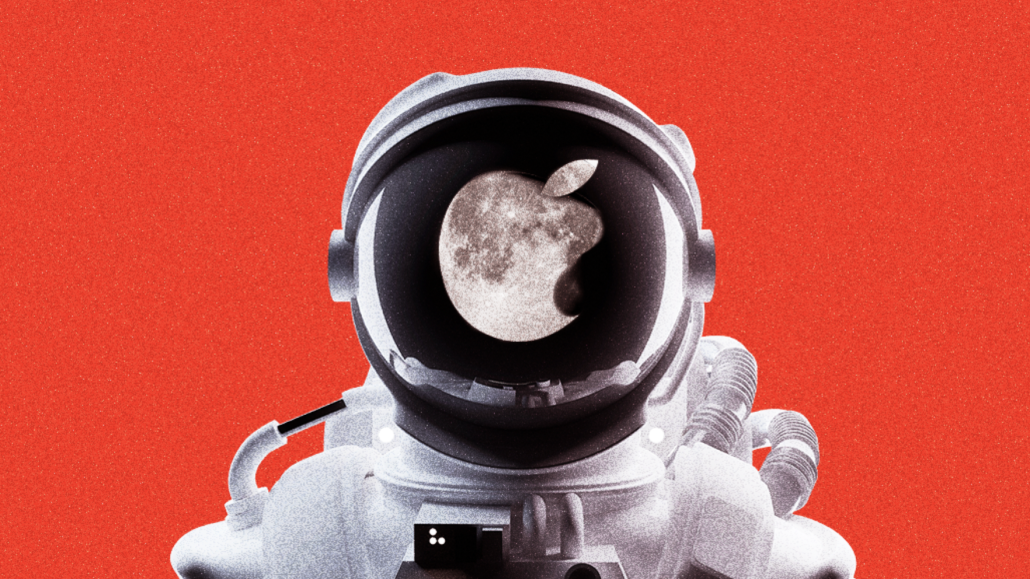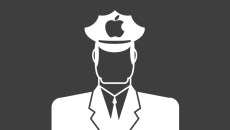Secure your place at the Digiday Media Buying Summit in Nashville, March 2-4
Apple’s AI-hype at WWDC underlines its position as the final boss of Big Tech

At the World Wide Developer Conference, Apple executives previewed operating system updates for its desktop, mobile and peripheral devices, intended to entrench its position as one of the industry’s leading tech and media corporations.
Apple Intelligence generated the bulk of mass media headlines, given it’s the tech giant’s primary gambit in the AI era and culmination of investments in cloud computing and on-device processing, not to mention partnerships with outfits such as ChatGPT.
Meanwhile, those in the ad-supported media landscape will likely breathe a sigh of relief as speculation of a dreaded “web eraser tool” was not realized. Still, ad-supported media players — buy- and sell-side players alike — should heed specific announcements.
The series of product updates were introduced by a cast of familiar Apple execs such as CEO Tim Cook and svp of software engineering Craig Federighi; the faces of previous WWDC updates such as App Tracking Transparency, Private Relay and Privacy Manifests that sent chills up and down Madison Avenue.
Locking up its user base
Tellingly, one of the iOS18 updates from the June 10 event lets iPhone users hide just what apps are installed on their device from others, as well as the information inside them; this ability to “lock an app” is a concept now in evidence throughout the ecosystem.
Federeghi’s Apple summed up the concept of protecting sensitive information inside specific apps, such as banking or calendar apps, and the information inside them — even if others have another’s iOS device in their hands.
“When you choose to lock an app, and someone tries to tap it, they will be required to authenticate,” he explained, “information from inside the app won’t appear in other places across the system, like in search and notifications, so others will inadvertently see sensitive information.”
Separately, Beth Dakin, senior software engineer, Apple, previewed how macOS Sequoia updates will change how users visiting websites via the tech giant’s Safari web browser will interact with content via a series of tools that highlight specific content.
“Safari is also a trailblazer and privacy with industry-leading intelligent tracking prevention and private browsing that’s actually private,” she said. “It not only protects your history, it prevents websites from seeing what you do while you browse.”
Pending updates to Safari means it will employ machine learning to “streamline” their browsing experience by highlighting specific user information, such as the contact details of a featured business, including a tool that places video content front and center of a page.
“You can listen to an artist’s music or check out a new show with just a click and even get a summary so you can get the gist before reading on,” she added. “Summaries are also integrated into a redesigned reader. Reader instantly removes distractions from articles, and now it can provide a table of contents and includes a helpful summary right next to the article.”
What does this mean for the marketing industry?
In the weeks ahead of WWDC, Apple Insider previewed a potential “web eraser tool” that was characterized as an effective ad-blocker built into Safari.
Speculation reached a level that both Business Insider and The Financial Times reported how Europe-based publishers were spooked to the extent of writing letters of objection to Apple, with the accompanying publicity surely a bid to catch the eye of regulators.
In his assessment, industry analyst and investor at Heracles Capital Eric Seufert, noted how such an introduction would “represent a considerable escalation” in restricting the business model of many publishers.
“A native ad blocker is difficult to justify with privacy considerations: Safari’s Intelligent Tracking Prevention (ITP) framework already blocks third-party cookies completely and limits the functionality of first-party cookies,” he wrote in a June 6 post on Mobile Dev Memo.
Considering how competition considerations are thwarting the privacy policies of fellow Big Tech giant Google and its attempts to subset third-party cookies in its web browser Chrome it’s worth considering if similar concerns played a role in Apple’s latest decision with macOS18–see the discussion below on social media platform X (formerly Twitter).
Furthermore, it is also worth considering how the Discover, Highlights, Reader and Viewer features presented by Dakin represent Apple (ever-so-lightly) tightening the screws in Safari as they represent Apple further manipulating how content generated by a media owner is presented to Safari users.
For seasoned observers, the tech giant’s intentions are clear; developments such as Apple Intelligence are designed to shore up its reputation as the leading privacy-enhancing player among the Big Tech cohort and further ringfence its user base from the data-hungry throngs of ad tech.
Privacy Cloud Compute
Addressing WWDC attendees, Federeighi noted that on-device processing is at the center of Apple’s privacy pitch to consumers and an ecosystem it intends to police from would-be interlopers — after all, it’s Apple’s ecosystem. If anyone is going to monetize it, shouldn’t it be them?
“Server software is only accessible to its owners; even if a company says it’s not misusing your data, you’re unable to verify their claim or if it changes over time,” he said, introducing Private Cloud Compute.
“Powerful intelligence goes hand in hand with powerful privacy,” he said, noting how its “unique integration of hardware and software” enables it to fence off user data, claiming external data centers are out-of-bounds to encrypted Apple user data “unless its software has been publicly logged for inspection.”
Meanwhile, just days before the event kick-off, news of AdAttributionKit emerged, giving iOS developers more terms and conditions to ponder, and a feature that some have interpreted as the natural evolution of SKAdNetwork, a rollout that some have deemed a misstep from Apple.
For some, this could be a precursor to Apple taking another shot at ad monetization, a prospect many are likely to speculate on at the advertising industry’s Grand Prix conference Cannes Lions Festival of Creativity — an event where its presence has been noticeably increasing in recent years.
Speaking with Digiday ahead of the June 10 presentations, Charles Manning, CEO, Kochava, noted how Apple’s approach is likely to imbue the trust of its 2.2 billion device users.
“I think there’s a high likelihood that Apple would be successful at training the consumer to prefer apps that have the little [Apple] lock and logo inside of it because it’s privacy-safe,” he said. “I think that will then be a driver for publishers to change who they use for their monetization partnerships.”
More in Media

From feeds to streets: How mega influencer Haley Baylee is diversifying beyond platform algorithms
Kalil is partnering with LinkNYC to take her social media content into the real world and the streets of NYC.

‘A brand trip’: How the creator economy showed up at this year’s Super Bowl
Super Bowl 2026 had more on-the-ground brand activations and creator participation than ever, showcasing how it’s become a massive IRL moment for the creator economy.

Media Briefing: Turning scraped content into paid assets — Amazon and Microsoft build AI marketplaces
Amazon plans an AI content marketplace to join Microsoft’s efforts and pay publishers — but it relies on AI com stop scraping for free.









